April 2021
Lloyds Bank Joins the Executive Committee

By David Cleary, MD & Head of Housing, Corporate & Institutional Coverage, Lloyds Banking Group
As announced at the 2020 NextGeneration Results, I am delighted and honoured that myself and my colleague David Willock, MD & Head of ESG Finance and Structuring, Corporate & Institutional Coverage, have joined the Executive Committee and will represent Lloyds Bank. Joining the Executive Committee and supporting NextGeneration’s initiatives feels like a natural step for the bank, which is part of Lloyds Banking Group and has deep, long-standing involvement with the housing sector. Lloyds Banking Group is the largest lender to the housing sector, including providing almost £40bn of mortgages to first-time buyers since 2018. Meanwhile our commercial division is amongst the largest lenders to the housebuilding sector and has provided more than £9bn of finance to social housing providers since 2018. The Group’s pensions and investments division, Scottish Widows, has housing and social housing as a key investment focus and has invested £3.5bn in social housing, as it delivers a safe, long-term source of income to meet its customer annuity payments. The Group also directly supports the building of new homes through the Housing Growth Partnership, a joint venture with Homes England that specialises in supporting SME builders and has helped build more than 3,500 new homes since 2016.
Our proud support for all things housing-related has been strengthened further, with our recently announced new strategy, including a number of commitments designed to help Britain recover from the effects of the coronavirus pandemic. One of these commitments is to support the creation of a national sustainability standard for house building finance and joining this Executive Committee represents a key milestone in that aim. Having promoted sustainability in the UK housebuilding industry for over 15 years, we consider NextGeneration to be an ideal partner in Lloyds’ drive for positive change in the sector. Joining the Executive Committee also reflects the value that the we place on Sustainability (ESG report 2020) and our ongoing commitments to support the transition to a sustainable, low carbon economy, including pledges to ensure that our own operations are net zero and also to halve the carbon emissions we finance by 2030.
I, alongside the rest of the Lloyds team, am really excited by the opportunity to combine our housing and sustainability expertise and commitment to the sector with that of Homes England, UKGBC and JLL. We are all looking forward to working with the Committee and NextGeneration’s Members to continue to drive increased transparency and improved sustainability performance in the homebuilding sector.
March 2021
Who was named the UK’s most sustainable homebuilder in the 2020 NextGeneration Benchmark?
March 17 saw the launch of the 2020 NextGeneration Results at a packed webinar led by leaders from across the sector. Hosted virtually by Guy Grainger, Global Head of Sustainability Services & ESG at JLL, the event highlighted a range of exciting ways homebuilders’ can improve the sustainability of their operations and futureproof their homes. We were delighted to welcome Professor Sadie Morgan OBE, the co-founding director of Sterling Prize winning architecture firm dRMM, who provided an insightful keynote speech on the role of socially useful architecture in the residential sector. The Launch Event closed with a panel discussion between a selection of representatives who’s companies are flying the flag for greater sustainability in the sector. They discussed their experiences and challenges throughout the the past year, providing insights into how the sector can use their learnings from the pandemic to build healthier homes of the future. The participants were:
- Jon Di-Stefano, CEO of Telford Homes
- Sadie Morgan, Co-founding Director, dRMM
- Bukky Bird, Group Sustainability Director, Barratt Developments
- Kristy Lansdown, Project Director of Elephant Park, Lendlease
2020 NextGeneration Benchmark Results
The 2020 NextGeneration Results showed the significant steps leading homebuilders are taking to improve the sustainability of their operations and homes. Telford Homes topped the 2020 Benchmark for the first time, after a highly commendable 4-year winning streak? by Lendlease. Barratt Developments PLC and Lendlease achieved joint second to both secure Gold Awards, while Taylor Wimpey moved from fourth to fifth, achieving a Silver Award. New member Hill ranked ninth, a commendable improvement on their 19th position in 2016, when they first appeared on the benchmark.
Andrew Day, Sustainability Director at Telford Homes states: “Throughout this unprecedented year, continuing to shape and refine our Building a Living Legacy strategy has been more important than ever; helping us to better understand the materiality issues when balanced against the evolving policy landscape and societal shifts in attitudes. We are delighted that our dedication and progress has been continued to be recognised by the NextGeneration sustainability bench”.
Companies included in the Benchmark contribute to a total turnover of £33bn, account for 66% of homes built in the past year and directly employ 43,957 people. A continued broad range of rankings in 2020 highlights a significant disparity in sustainability impact and public disclosure of this information within the industry. However, the introduction of a higher Phase 1 weighting this year has rewarded companies that place more information in the public domain, as it is only through clearly sharing your sustainability information can the sector learn and improve. NextGeneration members continue to lead the way with an average score of over double the industry average (75 compared to 37), reflecting both the benefits of expert advice and peer learning, and the greater disclosure of sustainability information by members to the benchmark.
The 2020 NextGeneration Report was also released at the Launch. Based on extensive international research, the report focusses on how homebuilders can learn from the experiences of their customers alongside their own during the past year to respond to sustainability trends that have come to the fore due to the pandemic. Innovations in health and wellbeing, home flexibility and advanced building techniques are highlighted. By responding to these pandemic related experiences, homebuilders can place themselves in a strong position to adapt and succeed.
June 2020
The 2020 NextGeneration Innovation Forum: building homes for a healthier future
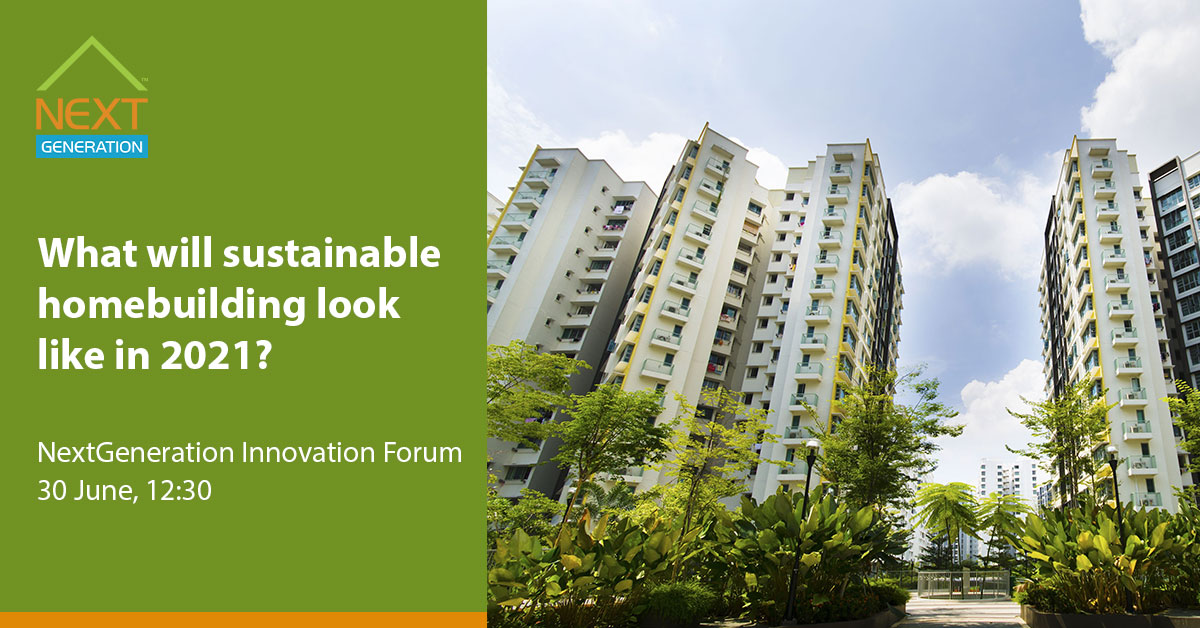
Covid-19 has turned the world on its head in 2020, so what better theme for the NextGeneration Innovation Forum this year. Three expert speakers imparted their wisdom on how best the homebuilding industry can batten down the hatches and then build back better to safely combat the lasting impacts of COVID-19 in the residential sector. Below are some key takeaways from the insightful presentations given by Jon Neale (Head of UK Research at JLL), Andy von Bradsky (Head of Architecture at the MHCLG) and Clara Bagenal George (Founder of the London Energy Transformation Initiative and Associate at Elementa Consulting).
Covid-19 has caused the worst recession since the end of the second world war. However, the homebuilding sector doesn’t look quite as bleak, as everyone still needs somewhere to live right?
While there have been slight reductions in house prices, in recessions it is the number of unit starts and completions that is disproportionately affected. For example, after the global financial crisis UK unit starts dropped by 57% to 100,000 new homes a year. Jump to today and we can see the sector is being supported by a raft of initiatives to mitigate against this, from stamp duty and mortgage holidays to base rates by the bank of England being cut to 0.1%, the lowest level in history.
Homebuyers are in for a rough time as Covid-19 is affecting who can buy and what they are looking for in a home. The young, while generally being less impacted medically by Covid-19, are having the door shut on them when it comes to homebuying as they are more likely to be unemployed and are currently renters. Meanwhile those that can afford to choose are projected to be prioritising health and wellbeing and green space, particularly as with an increase in homeworking, the commuter sphere will stretch further afield. Even so, this doesn’t mean a mass outflux from London in the long-term, as while some look to leave, , who feel more invincible to Covid-19 and who are less equipped for home working due to the size of dwelling they can afford. Overall the key for homebuilders is to listen and adapt to what their customers want.
Some of the expected design considerations required following the Covid-19 implications of a home becoming an office are comfort, space, adaptability and amenity. Amenity requirements are rapidly evolving for homebuyers, with outdoor space such as gardens and balconies becoming increasingly desirable.
And it’s not just the homes that need to change – on a development scale increased capacity for active travelling such as wider pedestrian zones is a clear must. At the same time, compact neighbourhoods are a necessity to allow communities to access critical amenities such as shops or health services without using public transport. While developers wrestle with these evolving community needs, it is vital that they engage with the people in those communities.
But Covid-19 is not the only predicament mankind is currently facing down: climate change is going to shake up the industry, through changing legislation, climate risks and consumer demand. To help homebuilders, LETI has produced the Climate Emergency Design Guide which is based on the work of over one hundred industry professionals and is a valuable resource for creating net zero carbon homes. From all this research, the critical number identified for the residential industry is 35kWh/m2 yr-1. This is the figure that represents the absolute amount of energy per unit of area per year (energy intensity) a home should consume if it is to achieve net zero carbon and not overuse its share of energy in the UK.
Nevertheless it is not just about numbers and design guides, it is also about people taking action. One of the best ways to help this is making climate change tangible. For example, in a development in Washington, once the harvested rainwater runs out, a resident must manually change to the mains water supply. This action forces people to realise that there is not an endless supply of water, much like there is not an endless amount of excess CO2 emissions the earth’s systems can endure.
We would like to thank our speakers for providing valuable insights into the critical issues we are facing as an industry. From NextGeneration’s perspective one of the key takeaways is that homebuilders must be attuned to customers’ changing needs in a world shaped by Covid-19, both in terms of maintaining their health and wellbeing, alongside responding to the increase in homeworking.
NextGeneration looks forward to seeing in the future how the industry surmounts these challenges, to support sustainable living for all.
2020
A Transparent Benchmark: the NextGeneration Benchmark criteria have been released
Climate risk, net zero carbon, circular economy, net positive biodiversity – how is your company approaching these key sustainability issues? Are your investors asking about it? The NextGeneration sustainability benchmark for homebuilders can be used as a tool to tackle imperative sustainability issues at the forefront of today’s agenda.
And you are in luck, this year the NextGeneration Benchmark Criteria was released into the public domain to increase sector transparency and to support homebuilders to improve their sustainability performance.
To celebrate this important decision, the NextGeneration team hosted the Criteria Release Webinar on Wednesday the 25th of March to explain the key features of the benchmark, highlight best practice case studies and answer any questions.
Developed in collaboration with the industry for over 15 years, NextGeneration works by inspiring companies to report against a wide range of criteria relating to high-quality sustainable homebuilding. The criteria cover 15 focus areas from strategy and governance to environmental performance data to design and placemaking.
In a time when there is substantial impetus within the market to improve company’s sustainability performance, as investors ask more questions and homebuyers demand more, utilising the NextGeneration Benchmark Criteria can help ensure you are aligned to industry best practice.
If you have any questions regarding the NextGeneration Criteria or are interested in becoming a member, please email Diana McHugh at diana.mchugh@eu.jll.com
December 2019
The New Kid on the Block: introducing the Crystal Award
This year we are excited to introduce the Crystal Award that recognises the highest performing homebuilder during Phase 1 of the benchmark, where homebuilders’ publicly available information is assessed. The winner of the Crystal Award places clearly stated sustainability targets, performance data and case studies in the public realm. This provides the industry with a detailed understanding of the company’s strategic approach to sustainability and the positive change they are delivering on the ground.
We are delighted to announce the winner of the first annual Crystal Award is Barratt Developments plc. At a time when companies’ impact on the planet and society is subject to increasing scrutiny, crystal clear communication to external stakeholders is critical.
Sarah Pratt, Head of Corporate Sustainability at Barratt Developments states: “We have a clear aim, to be the leading sustainable housebuilder in the country so we are very pleased to retain our gold NextGeneration status. To have also received a Crystal award for the transparency of our environmental and social disclosures underlines our belief that housebuilders need to build trust with stakeholders, and by doing so we hope to drive greater openness across the industry.”
December 2019
Who will be named the most sustainable homebuilder in the UK in the 2019 NextGeneration Benchmark?
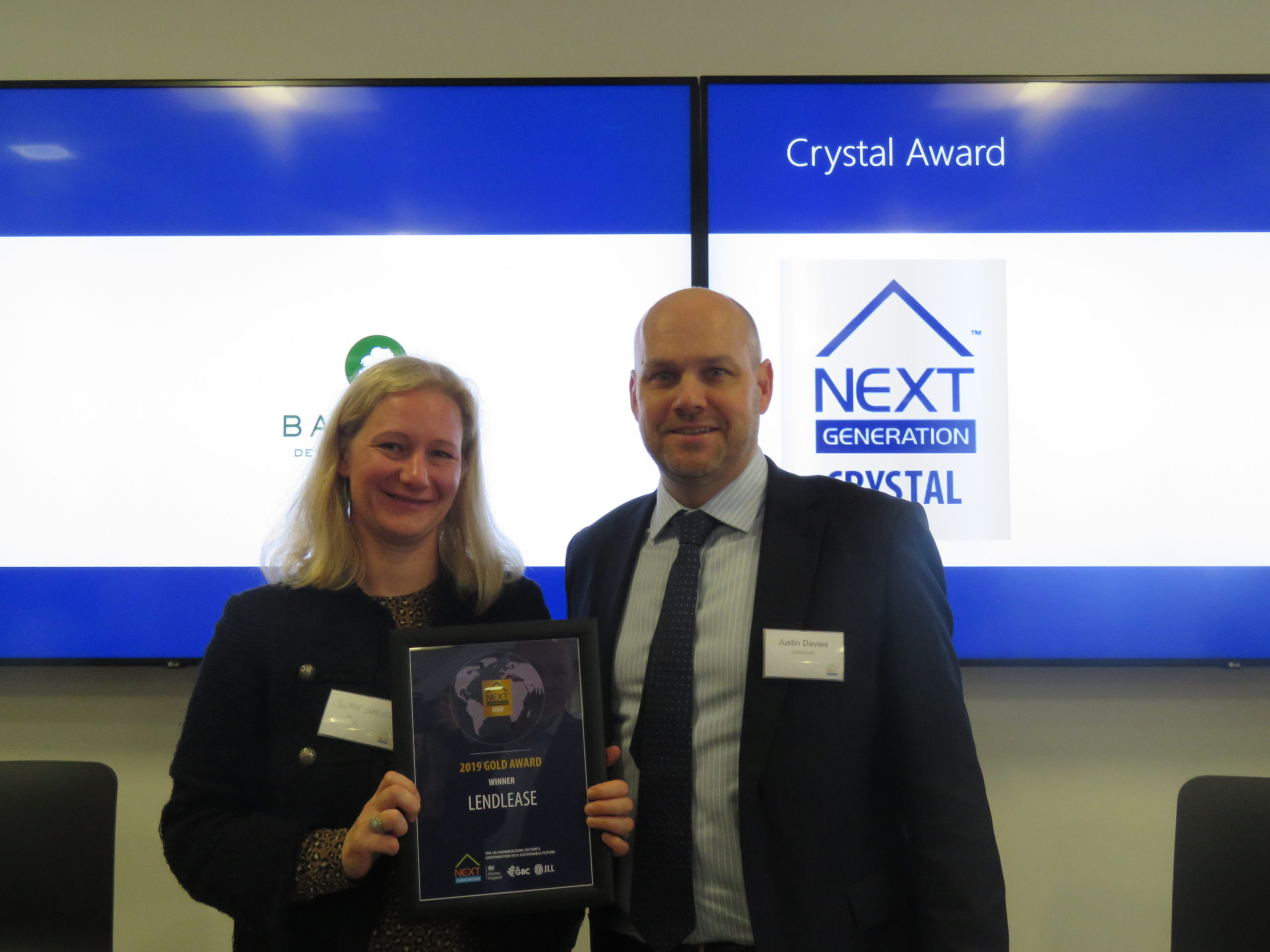
Lendlease Head of Development Operations, Justin Davies, being presented with their Gold Award
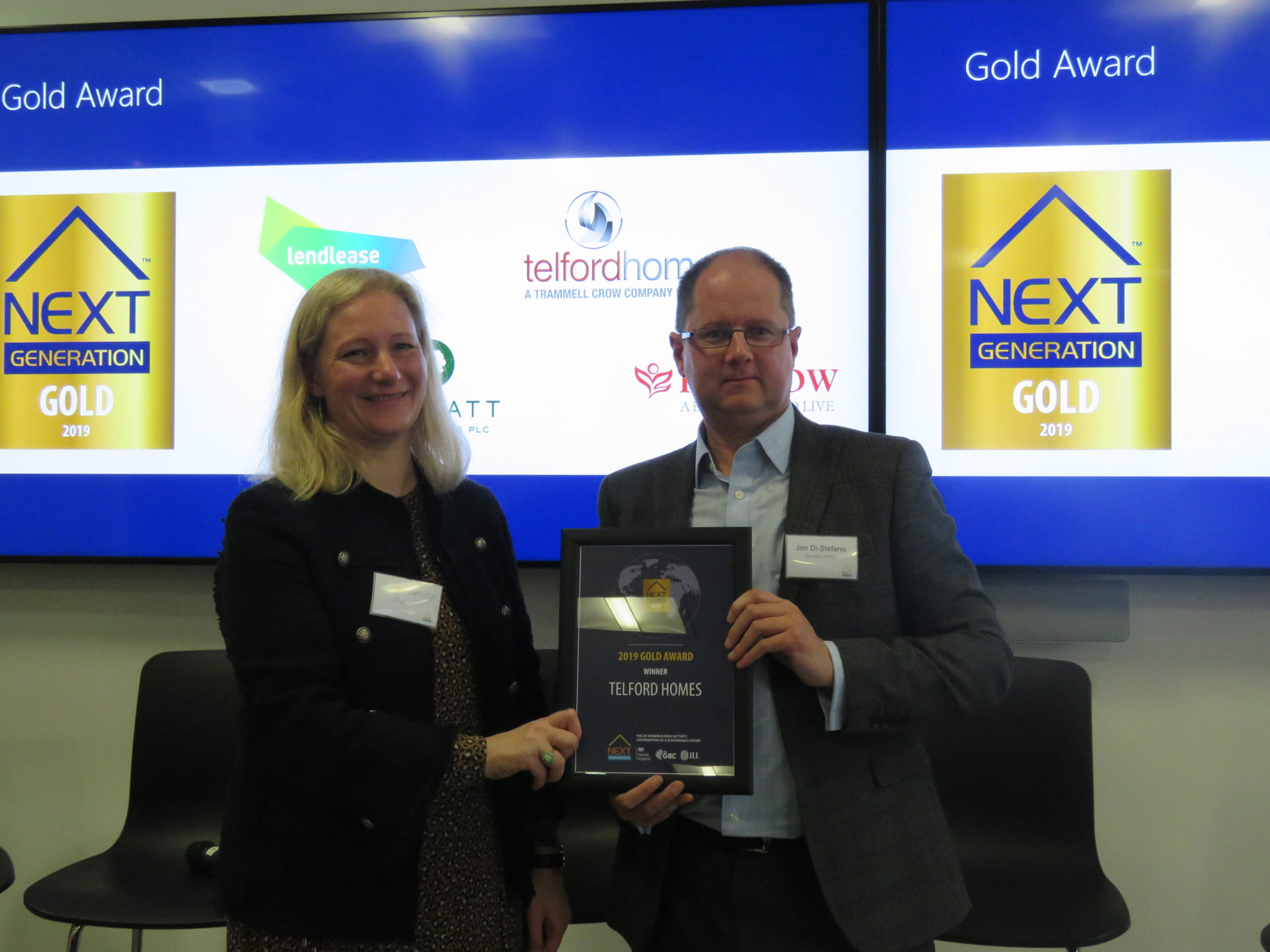
Telford Homes CEO, Jon Di-Stefano, being presented with Telford’s Gold Award
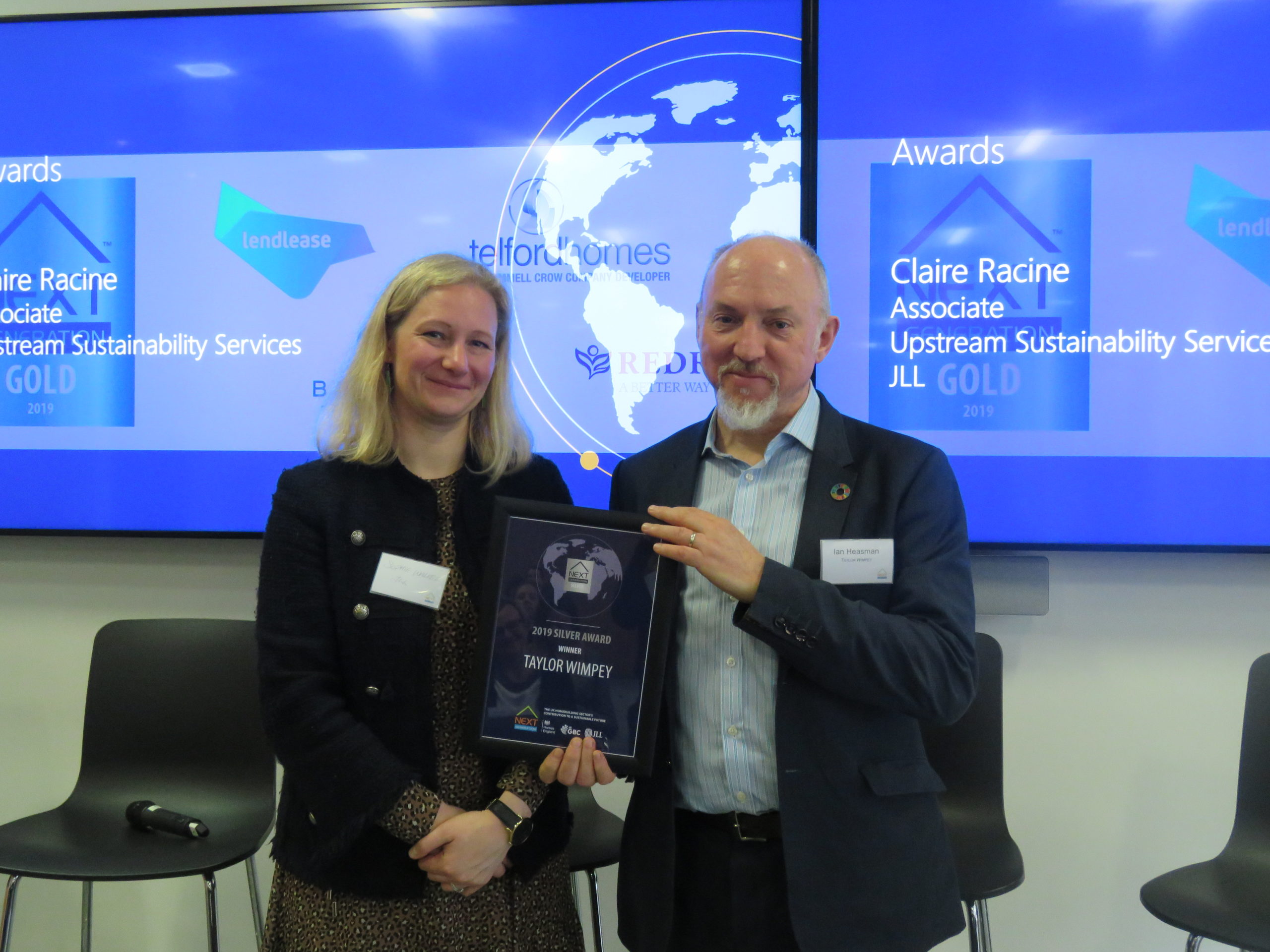
Taylor Wimpey Director of Sustainability, Ian Heasman, being presented with Taylor Wimpey’s Silver Award
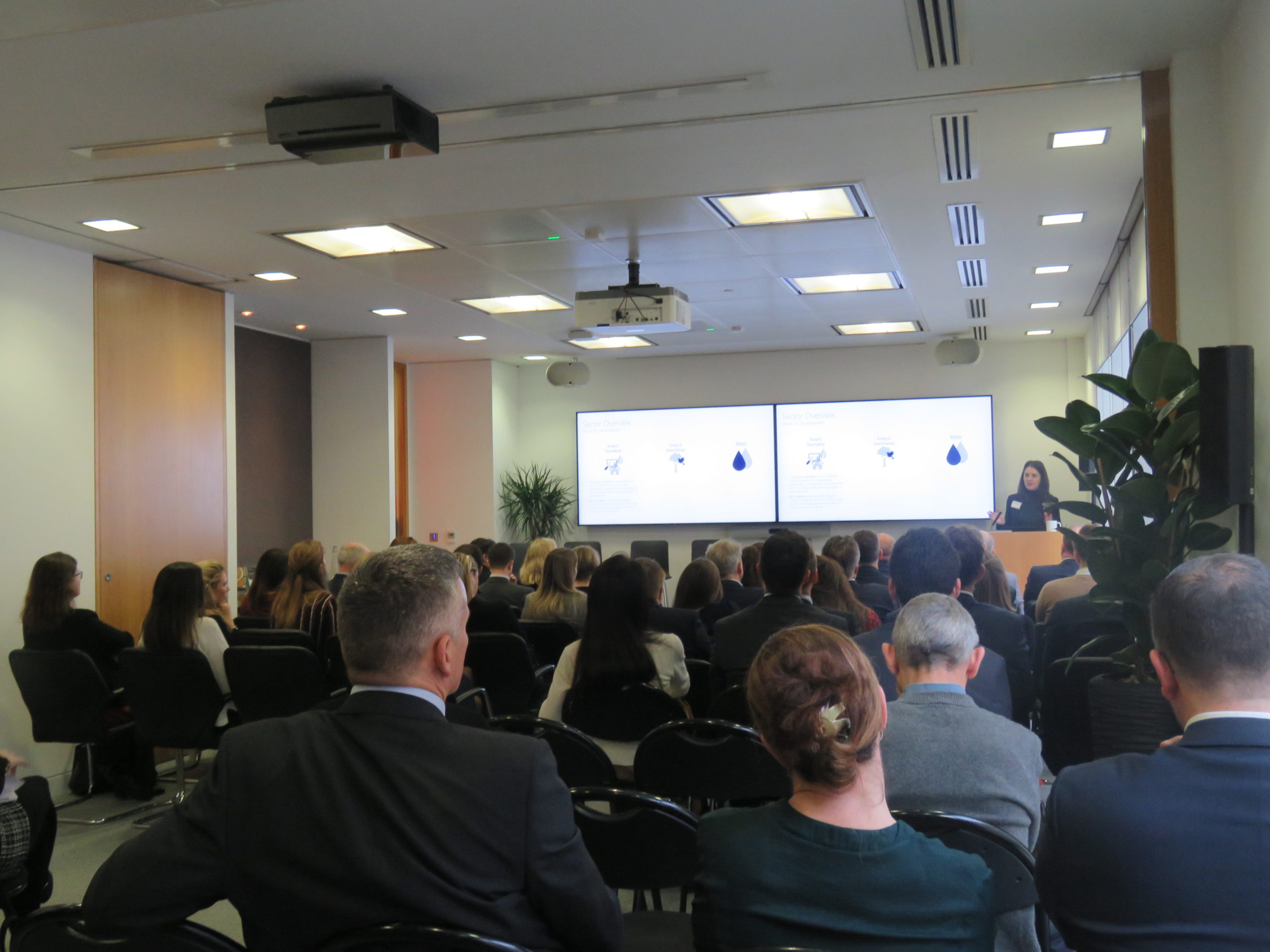
2019 NextGeneration Benchmark Launch Event

2019 NextGeneration Benchmark Results
The 2019 NextGeneration results were announced at the Launch on 3rd December, which brought together developers, investors and key stakeholders from across the sector. We were delighted to welcome Sarah Cary, the Executive Director of Place for Enfield Council, who gave an insightful keynote speech on the impact of climate change on Local Government services during the current heatwave, which will be a light prelude to future climate disruption. The Launch closed with a panel discussion between some of the leaders in the homebuilding industry, who discussed how their companies are addressing climate change:
- David Thomas, CEO of Barratt Developments
- Jon Di-Stefano, CEO of Telford Homes
- Justin Davies, Head of Development Operations, Lendlease
- Lee Bishop, Major Developments Director, Taylor Wimpey
Lendlease topped the 2019 Benchmark for the fourth year in a row with another strong performance, particularly across placemaking, health and safety and biodiversity. Telford Homes increased their ranking to second while Redrow and Barratt Developments plc came in third and fourth respectively, completing the group of companies that achieved a gold award. Taylor Wimpey secured fifth place and achieved a silver award.
Justin Davies, Head of Residential – Europe at Lendlease states: “Topping the benchmark again is really encouraging and testament to the hard work of everyone at Lendlease. As an industry we’re all doing our own bit to improve the way we build homes. But if we are going to see the changes required to meet the UK’s commitments on climate change then we are going to have to collaborate.
There are a number of areas where industry-wide sharing and collaborating could potentially trigger major improvements, especially in areas such as reducing embodied carbon in construction materials and establishing the best pathway to a zero-carbon future.”
Companies represented in the benchmark have a total turnover of over £33bn and account for 56% of all new homes built in the past year. NextGeneration’s 2019 rankings highlight a significant disparity between the transparency, impact and efforts of homebuilders publicly disclosing their efforts to improve the sustainability of their businesses. NextGeneration members continue to lead with a member average nearly double the overall industry average (74.7% compared to 32.3%), reflecting both the benefits of expert advice and peer learning, and the greater disclosure of sustainability information by members to the benchmark.
The 2019 NextGeneration report was also released at the Launch. It focuses on how climate change will affect the homebuilding industry and what can be done to mitigate the impacts. Key investor and regulatory drivers are explored and several future technologies that companies can use to “beat the heat” are highlighted. By taking a proactive approach to mitigating climate change risks and by anticipating future policy changes, homebuilders can place themselves in a strong position to financially succeed by futureproofing their homes and business.
2019
Bricks and mortar boards: Barratt Sponsored Degree programmes help plug the skills gap

Thomas Reason (centre) graduates from the Residential Development and Construction Programme (left: David Thomas, CEO; right: Steven Boyes, COO)
To help mitigate the growing skills gap in the construction industry, leading homebuilders have developed flexible programmes that support a work-education balance to encourage today’s youth to join the industry. John Bowden, Corporate Sustainability Co-ordinator at Barratt Development PLC highlights the positive impacts of Barratt’s Sponsored Degree programmes below.
“When schooling comes to an end, choosing whether it is best to stay in the classroom and gain further qualifications, or to look for work right away to gain experience on the job can be a tough decision to make. The debts stacked up by graduates in full time education are also an increasing factor in deciding what to do next for many young people.
The Barratt Sponsored Degree Programme offers an alternative solution. Endorsed by the Home Builders Federation, the degree enables those who enrol to start a real salaried job and gain a BSc Honours degree in either Construction or Commercial fields on completion of the programme.
The sponsored degree is part of a range of efforts taken by housebuilders to plug the skills gap that the industry knows it must tackle to secure a successful future. A third of housebuilding workers are over the age of 50, but research indicates many young people do not select housebuilding as a career choice with a lack of understanding over the range of opportunities available being a contributing factor.
The five-year programmes are run in partnership with Sheffield Hallam University and two degrees are available: the Sponsored Construction Degree resulting in a BSc (Hons) Professional Practice in Residential Development and Construction qualification; or the Sponsored Commercial Degree resulting in a BSc (Hons) Professional Practice in Residential Development and Quantity Surveying qualification. Completion of both is intended to fast track the graduates into leadership roles soon after.
Students on the programme can expect a wide range of learning activities, says Barratt’s Head of Talent Management, Andy George.
“Key to the programme is ensuring balance between the academic study conducted at Sheffield Hallam, where students take four teaching blocks per year, with getting out and learning how it’s done in practice. Students get plenty of time on construction sites but they also undertake rotations around the business. They are mentored by a senior manager to ensure they understand the full lifecycle of how a house in planned, built and sold.”
The Degree programme is heavily promoted through workshops and careers fairs, with construction ambassadors able to answer queries with real on-the-job experience. Learner’s networks are also used – the best advocates for the programme can be those who are on it. Information is available to learners on the Barratt Careers website and to students at the West Midlands Technical College of which Barratt is a Patron.
This outreach work has shown results. Since 2013, 129 employees have enrolled on the programme, and 86% of externally recruited students currently with the business have been promoted from Trainee Assistant Site Manager to Assistant Site Manager or above. There are currently 26 students on our Commercial Sponsored Degree, and we are looking to take on an additional 26 to start in January, and 21 new Construction students.
Thirty-two graduates have completed the BSc courses, a 100% achievement rate, a first for the housebuilding industry, and one has signed up to do an MBA.
The Sponsored Degree Programmes form part of a package of initiatives reflecting Barratt’s ‘Investing in Our People’ priority, and its sustainability focus area of Attracting, Inspiring and Retaining People. In its 2019 Annual Report, the Group adopted seven United Nations Sustainable Development Goals where it sees the potential to make the greatest contribution, including ‘Goal 8: Decent Work and Economic Growth’.”
John Bowden, Corporate Sustainability Co-ordinator at Barratt Development PLC
2019
Project 2020

In collaboration with the NextGeneration team, Taylor Wimpey held a tour of the Project 2020 prototype homes in Oxfordshire for the NextGeneration members on 12th September. Representatives from Barratt plc, Lendlease, Redrow Homes, Telford Homes and JLL saw first-hand how an innovative design competition came to fruition. Dr Anthony Lavers, Sustainability Analyst at Taylor Wimpey explains Project2020 in more detail below.
“Project 2020’ is Taylor Wimpey’s response to a changing world – an opportunity to design and build homes that will meet the needs of our future customers and leverage the innovations changing the construction sector. Launched in 2016 with an architectural design competition run in partnership with the Royal Institute of British Architects (RIBA), ‘Project 2020’ aims to test new house type designs that are innovative, sustainable, and appealing to the changing needs of customers. Now, three years after receiving entries for the design of these ‘homes of the future’ from architectural practices around the world, we’ve finished construction and are embedding the lessons learnt in Taylor Wimpey’s future strategy.
Who won the design competition?
We received over 100 entries for the Project 2020 houses from architectural practices in 14 countries. In the end, however, our judging panel concluded that the ‘Infinite House’ designed by Open Studio Architects in London best achieved the project’s objectives.
What have we built?
We’ve built nine ‘Infinite House’ prototypes in three different parts of the country – five in Oxfordshire, two in Manchester and two in Glasgow. Each region has trialled different construction techniques. In Oxfordshire, the prototypes have been built from cross-laminated timber; in Glasgow, our West Scotland business has used both a traditional timber kit and an advanced closed panel timber kit; and in Manchester, we have used traditional masonry techniques.
What are the sustainability features of the houses?
We wanted the ‘Infinite House’ prototypes to be as sustainable as possible, in terms of their energy and carbon efficiency and their positive impact on the health and wellbeing of our customers. We’ve achieved these goals by making homes that approach Passivhaus standards for air tightness and by building with materials that have excellent insulation properties. For example, the prototypes in Oxfordshire use wood fibre insulation. In Glasgow, one prototype has been fitted with a Sunamp heat battery that is charged by a solar photovoltaic panel. The heat battery provides the home with hot water.
We’ve also considered the health and wellbeing of our customers. The houses are designed to be adaptable and to accommodate different lifestyles, and to allow as much natural light in as possible. Floor to ceiling heights are higher than in most new build homes. And we’ve provided substantial living and storage space for our customers.
What have we learnt?
A lot! We’ve trialled new construction methods and thought about how suitable they are for our business. We’ve asked customers what they think about the look and layout of the houses and used their feedback to help us design a new range of homes. We’ve also learnt about responding to the future needs of our customers. As a result of Project 2020, we believe we’re well-placed to continue building a proud legacy now and into the future.”
Dr Anthony Lavers, Sustainability Analyst, Taylor Wimpey
2019
What innovative initiatives have the NextGeneration members developed over the past year?
To recognise projects that push beyond demands of the NextGeneration sustainability benchmark, every year we challenge our NextGeneration members to submit an example of sustainability that is not captured within the current criteria. John Dwyer, Group Sustainability Manager at Telford Homes explains their very successful Mental Health Weeks initiative below. We hope you feel as inspired as we do!
“It is now well understood that the construction industry suffers from one of the highest suicides rates, which for some trades is 2.7 times higher than the UK average. With this in mind and to coincide with World Mental Health day, Telford Homes has run two highly successful ‘Mental Health Weeks’ to help raise awareness amongst its employees, provide support for workers in the industry, and to eradicate the stigma of mental health. The weeks were planned and led by a dedicated “Health and Wellbeing” group who ran a variety of activities within our offices and construction sites.
To help maintain a focus on mental health longer-term we identified and trained 19 mental health first aiders and are training 10 dedicated mental health champions who can listen and provide advice on where to find the best professional support.
Underlining the importance of the campaign, our CEO launched the weeks and encouraged every member of staff to attend the sessions. The Group Managing Director closed the weeks and has since presented its importance to the Home Builder Federation (HBF) National Conference. Subsequently the HBF has teamed up with the Lighthouse Construction Industry Charity, a charity dedicated to delivering financial and emotional support to the construction community and their families.
Some examples of Telford Homes activities during the Mental Health Weeks included:
- Various well-being sessions and workshops provided by speakers from organisations such as the Samaritans, MIND, BUPA, the Lighthouse Club and more
- Educational activities including Mindfulness, Yoga and Lighthouse Club activities
- Healthy snacks and fresh fruit provided to staff to encourage a balanced diet
- Stress balls, shaped as hard hats, handed out to everyone in the business for use
- External “help” cards handed out to all staff and to share with families
- Dedicated section created on our intranet which holds recordings of all the presentations that were filmed as well as contacts and advice
- All First Aiders/ Champions wore specifically designed T-Shirts with the ‘Time to Talk’ logo and strap line, to promote the week, and to be recognisable for future contact and support
- Mental Health Toolbox Talks delivered to approximately 1,300 operatives on our sites
As a result, our employees are using the resources for support and taking positive steps to tackle any issues they have whilst also gaining a greater understanding of friends and family members who could be struggling.”
2019
Redrow’s Social Value Calculator recognised with NextGeneration Innovation Award
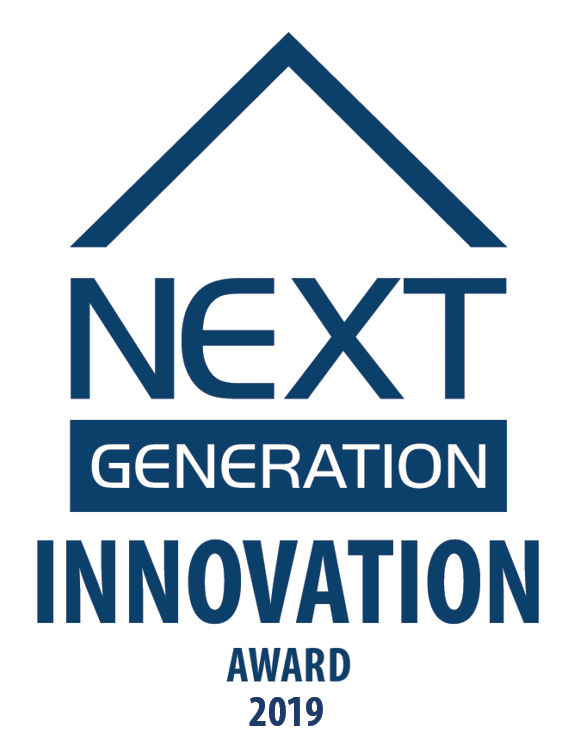
Last month, NextGeneration awarded Redrow with the Innovation Award in recognition of their impressive Social Value Calculator. The Executive Committee made up of UKGBC and Homes England were impressed with the many strong entries for the Award this year, but singled out Redrow due to the scope and robustness of the tool, alongside its potential to drive positive change across not just Redrow but the entire homebuilding industry.
Nicola Johansen, Group Sustainability Manager at Redrow, provides further details on the method used and key findings from Redrow’s award winning Social Value Calculator:
“The housebuilding industry in England and Wales is considered to be worth around £38bn a year, contributes £2.7bn in tax revenues, £841m towards infrastructure and supports almost 700,000 jobs. The design of new housing and communities built by this industry can have a profound effect on the health and wellbeing of residents and can provide additional value to those who live in or near them, yet measuring this impact can be tricky. Social value is on the government’s agenda and the industry is increasingly recognising its importance. In the government’s revised National Planning Policy Framework, for example, supporting strong, vibrant and healthy communities is defined as a priority, and as an industry that builds communities, we must see it as one too. By seeking a greater understanding of the social value associated with building new communities, housebuilders, local authorities and planning teams can develop a more informed perspective on the features and characteristics of a new development which are most likely to make people happier and healthier.
To get under the skin of how to measure this effectively, we worked with research consultancy Simetrica to create a social value calculator, and we are thrilled that the NextGeneration initiative selected us to receive the 2019 NextGeneration Innovation Award for our tool. This award builds on our success in 2018 where we won gold for the third year in a row in the NextGeneration Benchmark. By adopting methods used by the government to quantify the social impact of its policies, as outlined in HM Treasury’s Green Book, and surveying our customers to understand how much certain characteristics of where they lived contributed to their wellbeing, we are able to calculate the impact of healthy, friendly and nature-rich communities. The innovative calculator presents a monetary value against individual outcomes over a 25-year period, the typical length of a mortgage. For example, the tool calculated that over 25 years, 1 hectare of green space could contribute £9.7 million of social value, while having a pub, bar or restaurant in close proximity to a development can generate around £1.9 million.The research also found that living in a well-designed community of around 250 new homes where you feel welcomed and regularly speak to your neighbours can add just over £34 million worth of social value across that community.
At Redrow, we have always known instinctively that customers valued these features, but lacked a way of quantifying it. Therefore, the introduction of the calculator has enabled us to have more informed conversations with local authorities and planning teams about our homes and investment in community-focused infrastructure that will help improve people’s wellbeing. Our recommendations on community features are now underpinned by robust data, taking some of the ‘fluff’ out of potentially nebulous terms like ‘community’ and ‘wellbeing’. We believe housebuilders have a duty to not only deliver beautiful, high-quality homes but also places that help residents make important and meaningful social connections that enhance the quality of their lives long after we have left the site.
We are therefore very excited to see how recommendations garnered from our tool further improve people’s wellbeing going forward.”
2019
Win win at the NextGeneration Innovation Event
Redrow measure value while Town get residents involved.
The NextGeneration Innovation Award recognises sustainability initiatives by UK homebuilders that surpass the criteria used for the NextGeneration benchmark. Earlier this week Redrow Homes was awarded this year’s prize for their bespoke social value calculator, coming out ahead of a very strong field of entries.

The NextGeneration Executive Committee, comprising representatives from the UKGBC and Homes England, was “impressed by the ambitious scope and scale of the project submitted by Redrow for the Innovation Award. The Social Value Calculator offers a robust, academic, industry leading tool which focuses on a part of sustainability we recognise is of growing importance in the homebuilding sector. By developing this tool, Redrow not only promotes positive change on a large scale across their own business but also to the wider industry.”
Maria Gkonou, the Sustainability Manager for Redrow, presented the methodology used by the calculator to quantify social value and shared the results of the first round of their research. Redrow were surprised to find that community outcomes, such as borrowing from neighbours provided the highest overall additional social value compared to home, place and socio-economic outcomes such being close to green space. Feeling safe at home provided the highest total social value on the household level, above other outcomes such as views of nature or a larger than average home. The next step of the project will be to investigate how the findings can be used to improve future Redrow developments and residents’ wellbeing.
Guest speaker Neil Murphy from TOWN gave an inspiring talk on the process of developing their award-winning cohousing scheme: Marmalade Lane in Cambridge.

TOWN took a user-led custom build approach to the 42-household collective cohousing project. The future residents collaborated with the developers on the scheme design which prioritises quality housing as well as social and environmental initiatives. Marmalade Lane has limited parking spaces to encourage sustainable transportation, is close to passivhaus performance with an annual heating energy demand of 35kWh/m²/year across the site and includes a large shared garden and community hall to support group activities. As Neil explained, “you get better urbanism if you engage people in making it.”
Sophie Walker, Head of Sustainability at JLL UK acted as moderator of the discussion, sharing her expertise and insights while fielding questions from an audience of developers, investors and homebuilders. Overall it was a morning filled with inspiring innovation – thank you to everyone who attended!
What’s next? The NextGeneration benchmark annual report, which ranks the UK’s most sustainable homebuilder, will be released at the Launch Event scheduled for the beginning of December 2019.
2019
NextGeneration will be hosting its annual Innovation Event on the 25th of June
NextGeneration will be hosting its annual Innovation Event on the 25th of June, where the most innovative homebuilder will be awarded. The Innovation Award goes to a homebuilder that has demonstrated initiatives that go far beyond the criteria used for the benchmark.
Speakers at the event will include Indy Johar of Project 00 and Dark Matter Labs.
2019
Lendlease is named the UK’s most sustainable homebuilder in the NextGeneration 2018 benchmark
Sustainability performance of the UK’s 25 largest homebuilders revealed
NextGeneration, the benchmark which assesses and ranks the UK’s 25 largest homebuilders on their sustainability performance has today released its annual report which names Lendlease, Barratt Homes Developments and Redrow as the UK’s most sustainable homebuilders.
Lendlease tops this year’s benchmark for the 3rd year in a row with another strong performance in 2018. Lendlease’s Elephant and Castle development is 1 of 19 climate positive developments globally and it also recently secured a Global Healthy Workplaces Award. Barratt Homes and Redrow Homes come in 2nd and 3rd place respectively.
Richard Cook, Head of Residential Europe at Lendlease said, “For Lendlease, sustainability is about creating places for people and meeting their needs today, and in the future. Looking ahead, we’ve recently been appointed to deliver two of London’s largest urban regeneration projects at Euston and Silvertown Quays and we are excited to take our sustainability goals to the next level working with our partners on those projects.”


